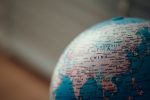Oct 14th, 2023 |
By Dr. Jim Eckman

With the 1945 victory in World War II, the United States began to construct an entirely new world order based on freedom of movement, global trade and a monetary system rooted in the American dollar. The implementation of that order produced the United Nations, NATO, the World Bank, The International Monetary Fund and other entities. Today, that order is coming apart and its effects are widespread and potentially destabilizing.
Posted in Featured Issues, Politics & Current Events |
Comments Off on The Shifting World Order In 2023
Sep 16th, 2023 |
By Dr. Jim Eckman

As columnist George Will so eloquently puts it: “This nation is slouching into the most predictable fiscal crisis in its history.” On 1 August 2023, Fitch Ratings lowered the credit rating of the United States one notch to AA+ from a perfect AAA. The firm, citing a “deterioration in governance” along with America’s mounting debt load, suggested that “it could be a long time before that decision [i]s reversed.” This credit rating change is similar to the drop to AA+ in 2011 by S&P Global, which has kept its rating there. There is a profound lack of willingness to compromise and reasonably discuss the national debt on the part of both political parties.
Posted in Featured Issues, Politics & Current Events |
Comments Off on The National Debt And The Imminent Fiscal Crisis
Sep 9th, 2023 |
By Dr. Jim Eckman

When our Founders wrote the Constitution in the summer of 1787, they structured this democratic-republic around a three-part federal government—an executive, a legislature and an independent judiciary. This separation of powers was to provide a built-in set of checks and balances to guarantee that no one individual or group of individuals would amass too much power. From the Marbury v. Madison opinion in 1803 by Chief Justice John Marshal, the judiciary has the authority of judicial review. It is the role of the judiciary to interpret the Constitution of the United States. To that end, the judiciary has the authority to review executive and legislative actions to determine whether those actions are constitutional or not.
Posted in Featured Issues, Politics & Current Events |
Comments Off on Rule Of Law And An Independent Judiciary
Sep 2nd, 2023 |
By Dr. Jim Eckman

The state of Israel captured the West Bank of the Jordan River from Jordan during the 1967 Six-Day War. Historically and biblically in terms of Israel’s history, this area is known as Judea and Samaria. It is part of the land God promised to Abraham by covenant (Genesis 12:1-7; 15:18, etc.). Since 1967, Israel has been slowly planting Jewish settlements on the West Bank, but this has accelerated and intensified under the current government of Benjamin Netanyahu. The expansion of these settlements runs counter to the so-called “two-state” solution, which refers to the creation of an independent Palestinian state alongside Israel.
Posted in Featured Issues, Politics & Current Events |
Comments Off on Israel And The West Bank: A Biblical And Historical Perspective
Aug 5th, 2023 |
By Dr. Jim Eckman

The First Amendment of the United States Constitution, ratified in 1791, begins: “Congress shall make no law respecting an establishment of religion, or prohibiting the free exercise thereof; or abridging the freedom of speech . . . .” In other words, there will be no state (i.e., “established”) religion in the US, while the United States will protect and guard the “free exercise of religion.” Even a cursory reading of this Amendment indicates tension and the need to balance prohibiting the Congress from establishing a specific religion with the protection of individual citizens’ free exercise of religious beliefs.
Posted in Featured Issues, Politics & Current Events |
Comments Off on The 2023 Supreme Court And Pluralism: Religious Liberty And Freedom Of Speech
Jul 1st, 2023 |
By Dr. Jim Eckman

Tim Keller, pastor of Redeemer Presbyterian Church in Manhattan (a church he planted with his wife Kathy in 1989), died of pancreatic cancer on Friday, 19 May 2023; he was 72 years old.
Posted in Featured Issues, Politics & Current Events |
Comments Off on Remembering Tim Keller
Apr 29th, 2023 |
By Dr. Jim Eckman

That Russia is committing war crimes against the Ukrainian people is an indisputable fact. Consider what Putin’s forces are doing to evangelical churches in Ukraine […] Russian war crimes in Ukraine are incontrovertible.
Posted in Featured Issues, Politics & Current Events |
Comments Off on Is The Ukraine Conflict A Just War?
Apr 22nd, 2023 |
By Dr. Jim Eckman

In mid-March 2023, Iran and Saudi Arabia agreed to reestablish diplomatic relations and reopen embassies after seven years of conflict and tension. The major diplomatic breakthrough negotiated with China lowers the chance of armed conflict between the Mideast rivals — both directly and in proxy conflicts around the region (e.g., Yemen). The deal, struck in Beijing amid its ceremonial National People’s Congress, represents a major diplomatic victory for the Chinese as Gulf Arab states perceive the United States slowly withdrawing from the wider Middle East.
Posted in Featured Issues, Politics & Current Events |
Comments Off on Saudi Arabia, Iran And Israel: The Shifting Sands Of The Middle East
Mar 4th, 2023 |
By Dr. Jim Eckman

To fully understand the development of American civilization, one must come to terms with the strategic role revivals have played. Colonial America was shaped and transformed by the First Great Awakening of the 1740s and the Methodist revival that followed. America of the early national period (1815-1850) was impacted by the Second Great Awakening. You cannot understand the energy for the abolition of slavery, the passion for women’s rights, the temperance movement and other social reform movements without coming to terms with this revival. But what about what is now being called the Asbury Revival in Wilmore, Kentucky? Is this the first major spiritual revival of the 21st century?
Posted in Featured Issues, Politics & Current Events |
Comments Off on The Asbury Revival
Feb 25th, 2023 |
By Dr. Jim Eckman

The Bible has much to say about the careful management of money, property and about wisely preparing for the future. Scripture affirms the wisdom of a balanced budget—whether talking about an individual, a business or the government: Significant debt is unwise and foolish! A few years ago, columnist and economist Robert Samuelson poignantly observed that “It’s getting harder and harder to write these budget columns, because it must be obvious to almost everyone by now that hardly anyone in Washington (or perhaps any place) cares about the budget deficits.
Posted in Featured Issues, Politics & Current Events |
Comments Off on Coming To Terms With The National Debt












